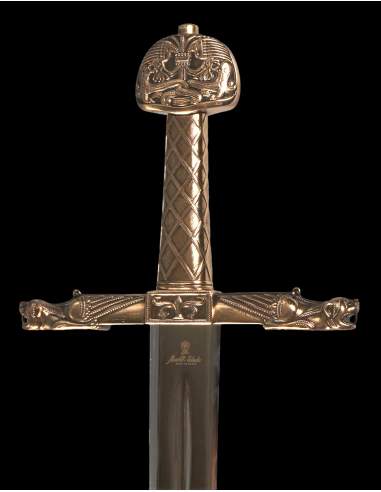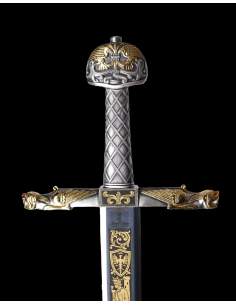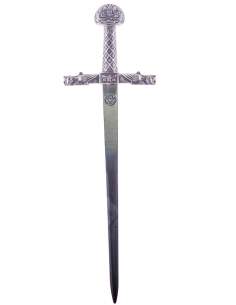Free shipping throughout Spain. International shipments to the whole world.
PERSONALIZED attention every day from 09:00 to 21:00
Charlemagne Sword (Bronze)
Replica of the legendary "Joyeuse" of Charlemagne. Currently in the Louvre Museum, but coming from the treasury of the Abbey of Saint-Denis. This sword has been used in the consecration of all the kings and emperors of France.
- Overall: 98 cm
- Width: 20,5 cm
- Weight: 1,7 kg
The sword of Joyeuse, which today sits in the Louvre Museum, is one of the most famous swords in history. Historical records link the sword to Charlemagne the Great, King of the Franks. If it did indeed belong to the famous king, who reigned some 1,200 years ago, the sword of Joyeuse would have been used in countless coronation ceremonies, and is tied with ancient myth and legend ascribing it with magical powers.
The story begins in the year 802 AD. Legend states that the sword of Joyeuse, meaning “joyful” in French, was forged by the famous blacksmith Galas, and took three years to complete. The sword was described as having magical powers associated with it. It was said to have been so bright that it could outshine the sun and blind its wielder's enemies in battle, and any person who wielded the legendary sword could not be poisoned. The Emperor Charlemagne, coming back from Spain was said to have set up camp in the region and acquired the sword.
The Eleventh Century Song of Roland describes the Emperor riding into battle in splendid war panoply, with Joyeuse by his side, saying "never was there a sword to match it; its colour changed thirty times a day" Amongst its alleged magical properties was an ability to blind its wielder's enemies with a bright radiance in battle and the ability to protect its wearer from all poisons.
One story tells of how Charlemagne once lost Joyeuse and promised a great reward to whoever found it. One of his knights returned it to the king who stuck it in the ground and declared the lands around that spot to belong to the knight from that point onward. According to the story, this is the origin of the French town of Joyeuse, which was founded on that spot and named in honour of the sword.
Charlemagne, Carolus Magnus, Charles the Great, king of Franks and Emperor of Western Europe, was born in 742, and became a famous commander in one of the great centres of power of history: The Sacred Roman Empire.
Charlemagne’s empire was based on fighting strength of the Franks, a confederation of barbarian tribes from the land of the Rhin in Germany. They fulfilled the emptiness of power after the fall of the Roman Empire. Their insatiable ambition, sometimes increased due to the goal of extending Christendom, led them to France, Germany, Italy and many other territories.
An aggressive conqueror, wise politician, state man, and fortunate General, Charlemagne set the shape of the vast empire that, in different ways, has reached the XX century.
High Quality Sword of the Exclusive Collection "Historical, Fantastic and Legend Swords" made by MARTO.
Certificate of Quality and Origin, Made in Toledo (Spain)
You might also like













